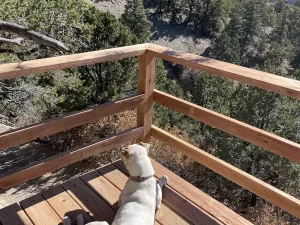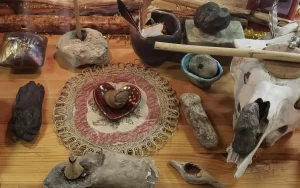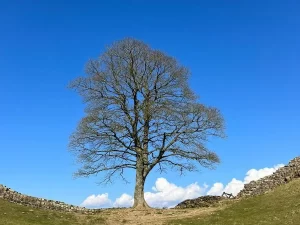How do we become aware of the survival strategies and coping skills that we have become so attached to? How can we let go of the unconscious survival strategies that have their roots in ancestral trauma and prevent us from living our fullest, most creative lives?
Let me begin by exploring what I mean by survival strategies and giving a few examples. Survival strategies or coping skills are techniques, beliefs, actions that we originally put into place through a need to survive or cope with a situation in our lives. A very simple and well used example of a survival strategy is the way in which the ‘flight-or-fight’ response is triggered if we suddenly realize we are being chased by a bear. A combination of hormonal changes and physiological reactions enables us to react instantly to this life-threatening situation. Once the bear is no longer chasing us and we feel safe, our body goes from the survival mode back into its normal parasympathetic state over a relatively short period of time.
However, many of us are carrying and acting upon survival strategies or coping skills that were implemented in past generations and have been passed down the lineage through unintegrated trauma.
The best way to explain this is through a couple of examples. In my own motherline, the message passed down through the mothering was that in order to survive in this world you need a man. This story began in India in the 1860’s when my great-great-grandmother married a British man in order to improve her life in imperialist India. When he died suddenly ten years later, her children were taken away, enforcing the message that you can’t survive without a man.
This belief carried on through each generation. My own mother wanted to study and become a teacher. She wasn’t allowed to because her mother didn’t want her to become a ‘blue-stocking girl’ as that would mean she wouldn’t find a husband. In turn my mother taught me that I needed to marry to survive, one of her stock sayings was, “Marry for love but love where money is.”
Even today in my life, I have to expend a lot of conscious effort and inner work to believe in my own capacity to survive in the world independent of a partner. It is an ongoing journey to identify and not fall into the belief that I will die or end up homeless if something happens to Florian. The belief is inherited. It is in my cells. However much my conscious mind knows it’s not true, my unconscious acts upon it.
Another example of an inherited survival strategy is for example a child who came from a poor family where, while the mother was out looking for food, the child had to look after their little brothers and sisters. One day something happened and one of the younger children died in her care. Although it wasn’t her fault, she felt guilty and blamed herself for the rest of her life. She decided she would never make a mistake again and she would do this by controlling her environment and the people in it, because if she didn’t something terrible would happen. This reaction to the original trauma got passed down through the women in the lineage. The granddaughter wondered why she had so much stress and always needed to control everything in her environment so strictly. She had no idea that it came from her grandmother’s unintegrated trauma.
The last example is that of someone whose grandfather for example was a Nazi and responsible for war crimes during the holocaust. Although he was taken to court after the war, he was not convicted because so many of the Nazi party were protecting each other from within the post-war penal system. However, he lived the rest of his life trying to cover up his war crimes and present himself as a ‘good’ man. The future generations inherited a deep, pathological sensibility to criticism. They heard it when it wasn’t there and were constantly feeling they needed to defend themselves in life. Without knowing it consciously they had taken on the perpetrator trauma of a crime that their grandfather hadn’t paid the price for by feeling that they had done something wrong. The survival strategy was to defend themselves for an invisible crime they didn’t do. Of course, none of this is conscious. Like the first example it is all going on, on an unconscious level.
By the time these survival strategies have passed down a generation or two, any connection to the original trauma has been forgotten. They are so much a part of who we are that we don’t even see them as a learned strategy. We believe they are a part of our personality. They are who we are.
Here are a few examples of common survival strategies that play out in our lives:
- Dissociation
- Controlling the world around you
- Over worrying and concern for others (codependency)
- Avoidance
- Manic defenses – always being busy or tired
What has happened is that, unlike the example above with the bear, the underlying trauma or emotion hasn’t been integrated even though generations may have passed and the survival strategy is still in place. Without realizing it, we are blocking our true creative beingness in severely outdated and unconscious mechanisms that prevent us living our true, free and creative lives. We are stuck in behaviors and beliefs that are a result of a trauma that happened generations before.
The psyche is constantly working towards homeostasis much like the rest of our body systems. There will come a moment when the survival mechanism doesn’t work in the way it used to. Something is off. There is an internal struggle between growth and hanging onto the part of our behavior that needs to be released.
What really needs to be felt is the emotion lying behind the behavior—An emotion that is stuck in our cellular memory and that needs to be honored and integrated. This is the ancestral trauma that has come through unconsciously. It will continue to echo through the lineage, each generation unconsciously creating their own echo of the original trauma until we stop and look and feel and transform what is lying beneath.
Studies with Native Americans and their inherited trauma have shown that an important stage in healing ancestral trauma is narrating the story of what happened. This could be a story that is personal to your lineage or it could also be related to a whole community – a historical trauma.
When Florian and I begin working with a new client, a large part of the intake session is about the stories, the secrets, the traumas of the client’s lineages. Many people have never given this an ounce of thought until we begin delving, but often when connections are made and the emotional echo perceived, this is a big step towards healing and releasing the outdated behaviors.
As I have already said the most important way to release old, outdated survival mechanisms that have become so much part of our ego is to feel. “To feel is to Heal.”
Practice feeling as you go through your daily life. Notice how we use the survival strategies to avoid feeling. When a feeling starts to emerge instead of racing off into an avoidance or survival strategy, try to catch it and honor it. Prioritize the feeling and take time out to allow it to be felt in the physical body.
My advice is that, if you can, go into your room at the first hint of an unconscious feeling rising from the depths, lie on your bed and encourage the feeling to arise, to take up the space within you, all of you, and welcome it. There is nothing to do, nothing to change, just allow the feeling to circulate within you. This gets easier as you practice. When this becomes a habit, you will begin to recognize the resonance of the woundedness and with each opening to it, it will fade and take up less space as it is being honored and integrated. The witnessing part of you that begins to recognize and observe the inherited trauma is your essence, that part of you that has never been wounded. The gift in feeling the wound is not just that you are releasing the ingrained survival mechanism, but also that there is a part of you that will never be wounded. This is the part that observes.
Aromatics are incredibly helpful allies in this work. Start with oils such as rose attar to feel safe as you navigate the places that are full of fear and have been buried for generations, ruh khus will help you to be in your body so that the feelings can be welcomed on a physical level. Sandalwood is a great ally to take in your pocket as it constantly reminds us to connect to all aspects of ourself authentically.
If you are carrying ancestral echoes from the past and would like to release the outdated survival strategies that are keeping you from being the best and freest, creative version of yourself and you help doing this, find out more about our consultations here.
share this blog:
Recent Posts
Archives
- December 2023
- November 2023
- September 2022
- July 2022
- September 2021
- August 2021
- July 2021
- June 2021
- April 2021
- March 2021
- February 2021
- January 2021
- November 2020
- October 2020
- August 2020
- July 2020
- June 2020
- May 2020
- April 2020
- March 2020
- February 2020
- October 2019
- September 2019
- July 2019
- May 2019
- March 2019
- September 2018





